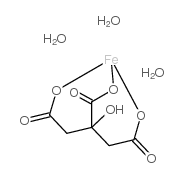Iron(III) citrate trihydrate
Modify Date: 2024-01-08 19:26:55

Iron(III) citrate trihydrate structure
|
Common Name | Iron(III) citrate trihydrate | ||
|---|---|---|---|---|
| CAS Number | 17217-76-4 | Molecular Weight | 298.99100 | |
| Density | N/A | Boiling Point | N/A | |
| Molecular Formula | C6H11FeO10 | Melting Point | N/A | |
| MSDS | N/A | Flash Point | N/A | |
| Name | 2-hydroxypropane-1,2,3-tricarboxylate,iron(3+),trihydrate |
|---|---|
| Synonym | More Synonyms |
| Molecular Formula | C6H11FeO10 |
|---|---|
| Molecular Weight | 298.99100 |
| Exact Mass | 298.97000 |
| PSA | 126.82000 |
Synonym:None Section 2 - COMPOSITION, INFORMATION ON INGREDIENTS
Risk Phrases: None Listed. Section 3 - HAZARDS IDENTIFICATION EMERGENCY OVERVIEW
The toxicological properties of this material have not been fully investigated.Light sensitive. Potential Health Effects Eye: Dust may cause mechanical irritation. Skin: No information regarding skin irritation and other potential effects was found. Ingestion: May cause irritation of the digestive tract. The toxicological properties of this substance have not been fully investigated. Inhalation: The toxicological properties of this substance have not been fully investigated. Inhalation of dust may cause respiratory tract irritation. Chronic: No information found. Section 4 - FIRST AID MEASURES Eyes: Immediately flush eyes with plenty of water for at least 15 minutes, occasionally lifting the upper and lower eyelids. Get medical aid immediately. Skin: Get medical aid. Flush skin with plenty of water for at least 15 minutes while removing contaminated clothing and shoes. Ingestion: If victim is conscious and alert, give 2-4 cupfuls of milk or water. Never give anything by mouth to an unconscious person. Get medical aid immediately. Inhalation: Remove from exposure and move to fresh air immediately. If not breathing, give artificial respiration. If breathing is difficult, give oxygen. Get medical aid. Notes to Physician: Section 5 - FIRE FIGHTING MEASURES General Information: As in any fire, wear a self-contained breathing apparatus in pressure-demand, MSHA/NIOSH (approved or equivalent), and full protective gear. During a fire, irritating and highly toxic gases may be generated by thermal decomposition or combustion. Extinguishing Media: Substance is noncombustible; use agent most appropriate to extinguish surrounding fire. Section 6 - ACCIDENTAL RELEASE MEASURES General Information: Use proper personal protective equipment as indicated in Section 8. Spills/Leaks: Vacuum or sweep up material and place into a suitable disposal container. Avoid generating dusty conditions. Section 7 - HANDLING and STORAGE Handling: Wash thoroughly after handling. Remove contaminated clothing and wash before reuse. Use with adequate ventilation. Minimize dust generation and accumulation. Avoid contact with eyes, skin, and clothing. Avoid ingestion and inhalation. Storage: Do not store in direct sunlight. Keep container closed when not in use. Store in a cool, dry, well-ventilated area away from incompatible substances. Section 8 - EXPOSURE CONTROLS, PERSONAL PROTECTION Engineering Controls: Use adequate ventilation to keep airborne concentrations low. Exposure Limits CAS# 17217-76-4: Personal Protective Equipment Eyes: Wear appropriate protective eyeglasses or chemical safety goggles as described by OSHA's eye and face protection regulations in 29 CFR 1910.133 or European Standard EN166. Skin: Wear appropriate protective gloves to prevent skin exposure. Clothing: Wear appropriate protective clothing to prevent skin exposure. Respirators: Follow the OSHA respirator regulations found in 29 CFR 1910.134 or European Standard EN 149. Use a NIOSH/MSHA or European Standard EN 149 approved respirator if exposure limits are exceeded or if irritation or other symptoms are experienced. Section 9 - PHYSICAL AND CHEMICAL PROPERTIES Physical State: Solid Color: red Odor: None reported. pH: Not available. Vapor Pressure: Not available. Viscosity: Not available. Boiling Point: Not available. Freezing/Melting Point: Not available. Autoignition Temperature: Not applicable. Flash Point: Not applicable. Explosion Limits, lower: Not available. Explosion Limits, upper: Not available. Decomposition Temperature: Not available. Solubility in water: Soluble in water. Specific Gravity/Density: Not available. Molecular Formula: C6H5O7Fe.3H2O Molecular Weight: 298.918 Section 10 - STABILITY AND REACTIVITY Chemical Stability: Stable under normal temperatures and pressures. May discolor on exposure to light. Conditions to Avoid: Incompatible materials, light. Incompatibilities with Other Materials: Strong oxidizing agents. Hazardous Decomposition Products: Carbon monoxide, irritating and toxic fumes and gases, carbon dioxide. Hazardous Polymerization: Has not been reported. Section 11 - TOXICOLOGICAL INFORMATION RTECS#: CAS# 17217-76-4 unlisted. LD50/LC50: Not available. Carcinogenicity: Iron (III) citrate, trihydrate - Not listed by ACGIH, IARC, or NTP. Section 12 - ECOLOGICAL INFORMATION Section 13 - DISPOSAL CONSIDERATIONS Products which are considered hazardous for supply are classified as Special Waste and the disposal of such chemicals is covered by regulations which may vary according to location. Contact a specialist disposal company or the local waste regulator for advice. Empty containers must be decontaminated before returning for recycling. Section 14 - TRANSPORT INFORMATION IATA Not regulated as a hazardous material. IMO Not regulated as a hazardous material. RID/ADR Not regulated as a hazardous material. Section 15 - REGULATORY INFORMATION European/International Regulations European Labeling in Accordance with EC Directives Hazard Symbols: Not available. Risk Phrases: Safety Phrases: WGK (Water Danger/Protection) CAS# 17217-76-4: No information available. Canada None of the chemicals in this product are listed on the DSL/NDSL list. CAS# 17217-76-4 is not listed on Canada's Ingredient Disclosure List. US FEDERAL TSCA CAS# 17217-76-4 is not on the TSCA Inventory because it is a hydrate. It is considered to be listed if the CAS number for the anhydrous form is on the inventory (40CFR720.3(u)(2)). SECTION 16 - ADDITIONAL INFORMATION N/A |
| Safety Phrases | 22 |
|---|
| Citronensaeure,Eisen(II)-Salz-Monohydrat |
| Ferric citrate (1:1) trihydrate |
| O576 |
| Iron(III) citrate trihydrate |
| citric acid,iron (II)-salt monohydrate |
| UNII-756B6D74H4 |
| Ferric citrate hydrate (JAN) |
| MFCD00149617 |
| 1,2,3-Propanetricarboxylic acid,2-hydroxy-,iron(3+) salt (1:1),trihydrate |
| ferric citrate trihydrate |